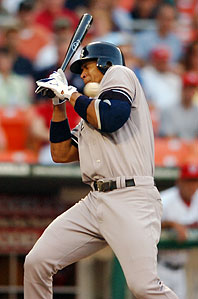
Alex Rodriguez’s epic slump—his regression from being the best player in baseball to a grounder-bobbling, bat-waving, blowfish-cheeked overgrown Little Leaguer—seems to be over. Two weeks ago, he hit five home runs in four days and was named American League Player of the Week. The boos at Yankee Stadium have turned to cheers. Some of us, however, are mourning the demise of A-Rod’s decline—because we understood its secret, revolutionary message.
He had become such a dominant player that he had begun riffing like an avant-garde jazz master on the nature of the game itself, extending his dominance to areas (strikeouts, errors, pop-ups) that less imaginative stars would never even consider. A-Rod was pioneering a radical new movement that we might call Atonal Baseball, in which—for the first time in the history of human competition—negative skills were valued just as highly as positive skills. (This has also been called, in certain circles, Existential, Conceptual, or Abstract-Expressionist Baseball.) A-Rod’s goal was not simply to fail at the game—to ground endlessly into double plays or commit five errors in five games—but to raise deep philosophical questions about the nature of human achievement. The reigning AL MVP recognized that, like painting before Cézanne or theater before Beckett, the art of baseball had reached an impasse; his bold solution was to abandon the constraints of traditional skills and strive for a new, more complex excellence—one made up, like the universe itself, of both dark and light matter, both pop-ups and home runs. He set out to prove that, just as he was the game’s most positively skilled player, he was also its most negatively skilled: The former batting champ struck out at a historic rate (fourteen out of twenty at-bats at one point); the former Gold Glove winner became the worst third-baseman in the American League (22 errors). In this light, A-Rod’s slump was actually an incredible hot streak: Over a ten-day period he compiled a torrid .886 negative batting average, with a strikeout percentage of .457. Every time he waved his bat distractedly at strike three in the dirt or ran into Jeter during a routine pop-up, he expanded the vocabulary of the human soul.
We can only hope that A-Rod’s recent reversion to his old “dominant” ways is just temporary—after all, no one can be imperfect all the time—and that soon he’ll rediscover his limitless negative potential. My guess, sadly, is that—out of a fear of being misunderstood, or ostracized, or benched—he’ll return permanently to his old robotic self and spend the rest of his career hitting for average and power, making diving stops and perfect throws, maybe winning another MVP or two. Baseball will be poorer for it—it will have regained a superstar but lost an artist. Next: ‘Gay America’ Get Behind Assembly Candidate
Have good intel? Send tips to intel@nymag.com.